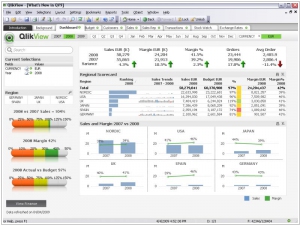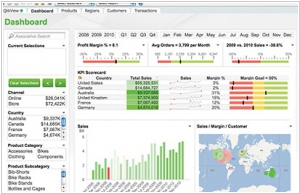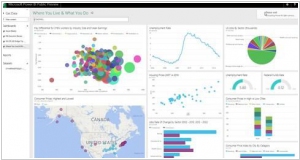Microsoft Power BI vs QlikView
June 05, 2023 | Author: Michael Stromann
15

The QlikView Business Discovery platform delivers true self-service business intelligence that empowers business users and drives innovative decision making. It helps organizations make transformative discoveries that lead to better decisions. QlikView goes beyond what other BI software provides by enabling users to analyze and search their data visualizations, make associations, and uncover insight that other BI tools can't find. What will you discover?
Microsoft Power BI and QlikView are both powerful business intelligence (BI) tools that enable users to analyze and visualize data, but they have distinct differences in their approach and features. Power BI, developed by Microsoft, offers a user-friendly and intuitive interface that integrates well with other Microsoft products and services. It provides a wide range of data connectors, extensive visualization options, and robust self-service analytics capabilities. Power BI is ideal for organizations already using Microsoft technologies and seeking a comprehensive BI solution that integrates seamlessly with their existing infrastructure. On the other hand, QlikView is known for its associative data model, which allows users to explore data relationships and associations dynamically. It offers a highly interactive and flexible interface, advanced data visualization capabilities, and powerful data discovery functionalities. QlikView is well-suited for users who prioritize data exploration and deep analysis, with a focus on uncovering insights and discovering hidden patterns.
See also: Top 10 Business Intelligence software
See also: Top 10 Business Intelligence software
Microsoft Power BI vs QlikView in our news:
2016. Qlik updates its BI and analytics engine

Qlik, a leading provider of Business Intelligence and Analytics Platforms, has recently introduced the latest release of QlikView Enterprise 3.0. This release brings forth significant enhancements in terms of visual analytics, custom analytics app support, embedded BI, and developer innovations. With Qlik Enterprise 3.0, users now have access to a new development hub, enabling them to fully leverage the capabilities of the Qlik Analytics Platform for web mashups, custom applications, and extensions. The release incorporates a new app integration API, empowering users to seamlessly integrate their applications, a visualization API for the programmatic creation of analytics, and a new integrated developer environment (IDE) plugin for Visual Studio. These advancements aim to provide users with a comprehensive suite of tools and functionalities to maximize their utilization of Qlik's Analytics Platform.
2015. Microsoft integrates Cortana into Power BI service

Microsoft has made an announcement stating that the Cortana personal assistant will be integrated into Power BI, its business intelligence tool. It's important to note that Power BI already possessed some natural language query capabilities. With this integration, Cortana will be able to respond to written and spoken queries using data sets from Power BI. For instance, users can ask questions like "What was the revenue for the last quarter?" or request a chart showing the "number of opportunities by team." To utilize this new feature, users must grant Cortana access to their Power BI data sets. It's worth mentioning that Microsoft also offers Cortana Analytics, which caters to enterprises and focuses more on the machine learning and automation services that drive Cortana, rather than the Cortana client itself.



